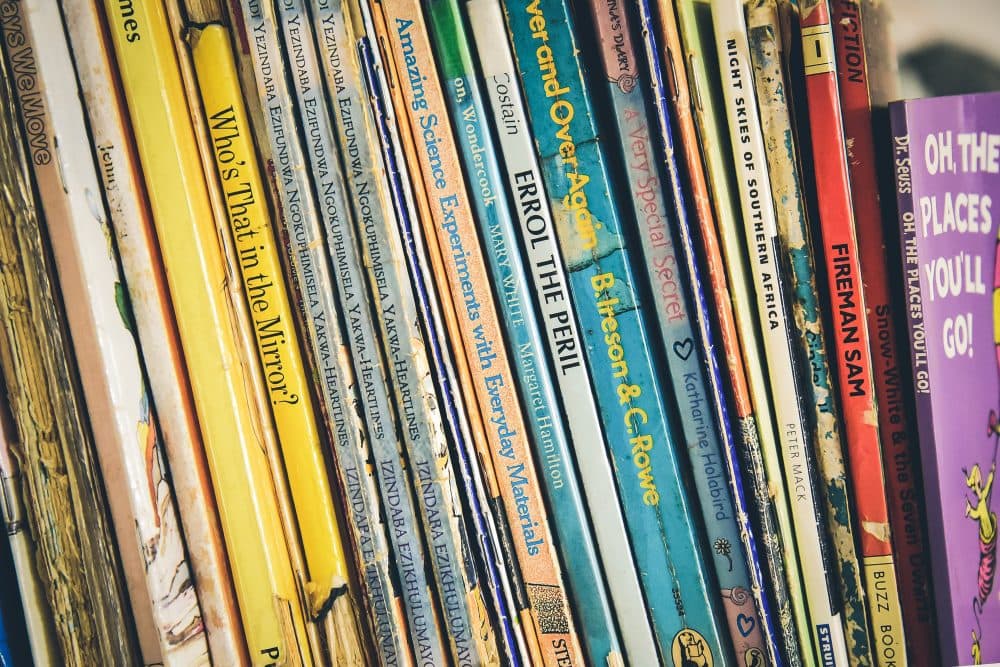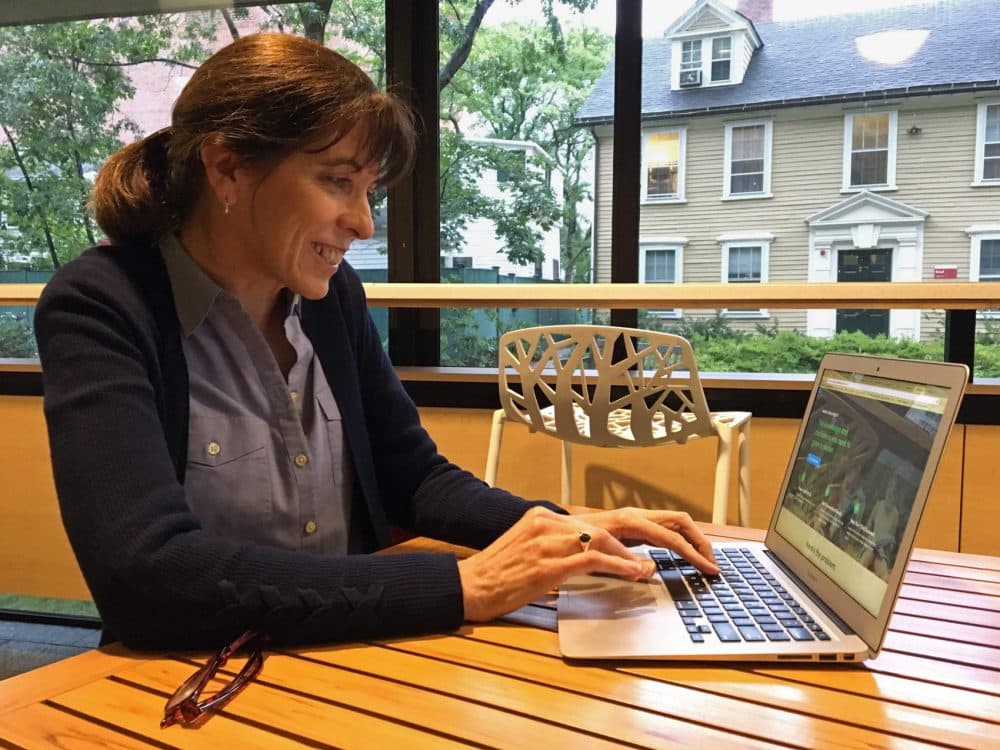Advertisement
A New Website Hopes To Help Parents Build Literacy At Home

Before she was an expert and an entrepreneur in early-childhood education, Joan Kelley was a parent.
Kelley had raised three children up to elementary school when she returned to school to seek her master’s degree at the Harvard Graduate School of Education (HGSE). A decade later, she thinks a memory from that time set her on her current path.
She was sitting in a lecture, learning a complicated lesson about literacy. Its foundations were broader and more complex than she ever realized — and yet, through little rituals and daily practice, parents can do so much to help their children get started on reading.
“I was almost angry about it,” Kelley remembers. “No one had ever spelled out for me, very clearly, what it takes to read successfully.”
With an online tool for parents called PUP Reading, Kelley is looking to spread the word: to provide parents with practical steps personalized to help their children, no matter where they are as learners.
“It’s not rocket science. Everyone should know this," Kelley says.
PUP launched late last month and is open to all subscribers. But a question that remains is how its simple lessons will reach the families who need it most.

The Story Of PUP
Back to the lecture that changed everything for Kelley.
The professor was Nonie Lesaux, who has built a national reputation looking for ways to build language and literacy in children from diverse backgrounds. Kelley has worked with Lesaux as a researcher since her graduation from HGSE, and they’re collaborating on PUP Reading.
Lesaux tells her students that literacy isn’t just mastery of “26 letters and 44 sounds" (though that’s still “absolutely essential,” Kelley adds). Reading requires other skills. Some are obvious, like a broad vocabulary and a concept of print — how books and written words work. With other skills, like self-regulation and empathy, the connections are less intuitive. But that doesn’t make them any less important.
Lesaux and Kelley want people to see literacy not just as a simple skill of decoding, but as a competency to be carefully built, one that depends on a variety of experiences, from “rich conversations” to rhyming and wordplay.
They've already spent years describing that change to lawmakers and educators, publishing reports like "Turning The Page: Refocusing Massachusetts for Reading Success," and drafting an early literacy curriculum for Boston Public Schools.
“It’s not rocket science. Everyone should know this.”
Joan Kelley, developer of PUP Reading
But that work can only go so far, given that more and more research suggests that the path to literacy begins shortly after birth.
David Dickinson, an expert at Vanderbilt, agrees with Lesaux and Kelley in concluding that "little brains are primed to learn language." Researchers like Dickinson and Lesaux have come to see the nine years from birth to third grade as one continuous pathway, during which various reading-related skills are introduced, modeled and taught -- or not.
Of course, that moves the work of building literacy to time and space beyond the classroom, especially to the home, where young readers spend the first few years of life and every evening after that. And American homes are extremely diverse -- linguistically, culturally and economically.
Lesaux knows her research is changing minds: She chairs the state board on early-childhood education, and she’s heard calls from figures like Speaker Robert DeLeo to make high-quality preschool an urgent priority in Massachusetts.
But when it comes to teaching parents about literacy, she says we’re stuck in the past. There are “lots of pamphlets,” Lesaux says, “some materials that come home with newborns” — nothing like the broad movement (PUP stands for “Parent Uptake Project”) that she and Kelley would like to see.
The pair considered publishing a workbook for parents. But then the technological age intervened -- in the person of Kelley’s programmer daughter.
“She said, ‘No, no, no, Mom -- people don’t want workbooks,’ ” Kelley says. She calls it the “big paradox”: that parents, eager to see their children make progress on reading, won’t read hundreds of pages to find out how.
'The Proof-Of-Concept Phase'
That’s where PUP Reading comes in, with a personalized, practical approach you might recognize from self-improvement apps, or Amazon’s front page.
PUP surveys parents every two months about how their children are performing by comparison with benchmarks borrowed from highly regarded state and national frameworks. For infants, you might be asked: “Can she make animal sounds?” or “When you give him books, does he like to look at pictures?” If your child is older, it asks if they enjoy books, or if they struggle with compound words like "flagpole" or "pancake."
Based on your answers, PUP then generates a chart showing how students are doing: in “code skills” -- again, those 26 letters and 44 sounds — but also with respect to “meaning-making” skills like strategic thinking and vocabulary and in “everyday learning”: attention, empathy and self-control.
And based on your results, PUP offers up exercises you might do, and books you might read, to build and enrich those skills. For one thriving preschool student, it might recommend reading chapter books aloud, or giving her three-step instructions; for one who's struggling, it suggests rhyming and rule-based play.
The goal is to create an index of progress that can be worked on and shared with teachers and pediatricians, Kelley says. That way, parents can catch learning disabilities early -- and come to see themselves as participants in their child’s development.
Kelley believes PUP's interactivity marks a step forward from the pamphlets.
“The questions are, by design, educative," she says. "We want you to think, ‘Why has this site just asked me if my child can sit in a circle and pass a ball around?’ We want to get people to really start thinking about what helps a child be successful as a reader.”
On the site, Lesaux explains the science behind its suggestions with sophistication and rigor. But the explanations are dense to the point, almost, of requiring advanced literacy of their (presumably grown-up) audience.
That, along with the cost of a PUP subscription — $50 a year -- can make the site seem better-suited for now to well-heeled, engaged, English-speaking parents than it is to the families that lag farthest behind in reading.
In 2015, at the earliest administration of the state's MCAS test -- in third grade -- only 40 percent of “economically disadvantaged” students scored a passing grade in English and language arts, and only 4 percent scored advanced. By comparison, 70 percent of students outside that category passed and 14 percent scored advanced. Among English-language learners, those gaps are even wider.
Vanderbilt's Dickinson points to the at-home practices that researchers see as building literacy: bedtime stories, unhurried conversations, play with imagination and language. “Parents who are well-educated may tend to engage in these activities spontaneously,” he says, while others — hurried by work or uncomfortable in English -- may not. (It's worth noting that pediatrician Sean Palfrey, who works in literacy, recommends book time to all parents, regardless of what language they speak at home.)
Kelley and Lesaux are alive to that criticism, and say that just weeks after the site opened to subscribers, they’ve only just begun. Lesaux describes this as “the proof-of-concept phase.” "Obviously, our heart is in [closing] achievement gaps,” Lesaux says — not in widening them further, as costly but effective interventions can risk.
Kelley says that the subscription fee is a way to cover the front-loaded development costs that went into PUP, which wasn't funded by school districts, grants or the government. It's possible that in Lesaux’s native Canada, PUP might have emerged as more of a social service than a startup. Here in America, Lesaux says, “there’s a little less collective action than we’d like.”
Kelley agrees that their goal is to help families that are falling behind, but she adds a caveat: "There are plenty of parents, in stable homes, without money problems, who actually find out too late that their child wasn't on track" with reading.
For now, the hope is that enough parents will pay for the service, and use it, that PUP can be tested, refined and proven over time — almost like an open beta.
"[Parents] are kind of forgetting about the engagement piece – all the conversations you can have with your child."
Joe Gibowicz, early-childhood education coordinator for Acton-Boxborough
PUP Out In The World
But the team behind PUP is also testing another way forward: sharing the resource for free with a nursery school and with early educators in the Acton-Boxborough school district.
Joe Gibowicz runs Acton-Boxborough’s program, which serves a suburban population of more than 100 children. Kelley approached him about training the district’s early educators with PUP and then giving it away — for free — to parents.
Gibowicz, who’s a 20-year veteran educator, says he’s skeptical of content-first approaches to the youngest students: “We’re seeing children come to us with less developed play skills, less ability to interact with other children.”
He blames a change in the way small children grow up in 2017: “a lot less outdoor time, a lot more focus on letters and numbers -- on knowledge.” He favors an emphasis on play and experimentation that build social skills. And so PUP, with its attention to social and emotional faculties alongside the ABCs, appealed to him.
Gibowicz is excited to remind parents of the habits of a pre-digital age, like outdoor time, long talks and unstructured play.
“I think it’s going to provide some activities that parents might not be focusing on anymore. They’re kind of forgetting about the engagement piece -- all the conversations you can have with your child,” Gibowicz says.
And he says teachers are excited, too -- that there’s a friendly and engaging way to enlist parents as partners in the work of education.
PUP is only one such tool, of course. But Gibowicz doesn’t underestimate the power of its aspirations. Knowing what we know now about education, deeper parental involvement “would be a sea change,” he says.
For now, Kelley and Lesaux will proceed carefully from their soft launch: seeing which parents opt in and monitoring progress. But if PUP Reading seems to make a difference, they may market it to districts with the same enthusiasms that Gibowicz has. If it works, PUP could end up free of charge on a web browser near you — the cost paid and the resource introduced by district or state authorities.
For now, parents looking for a leg up in literacy can choose to pay their own way, or not. Either way, the research says, they should recommit to the bedtime story.
